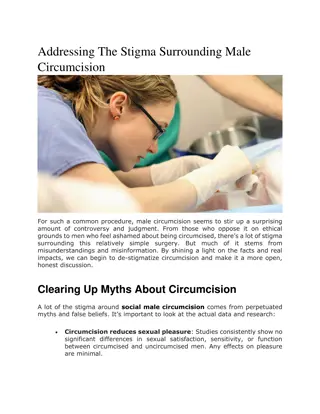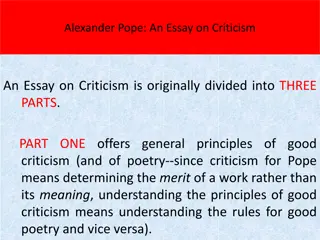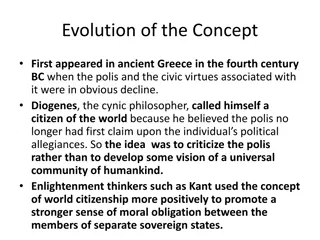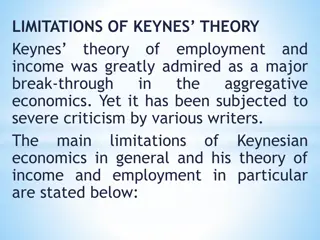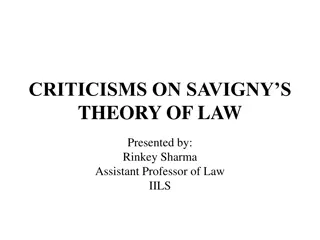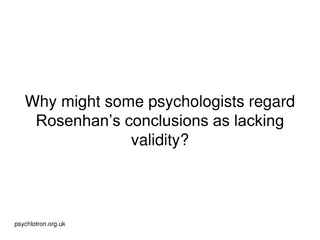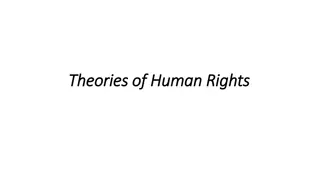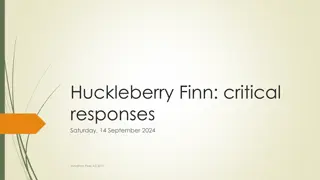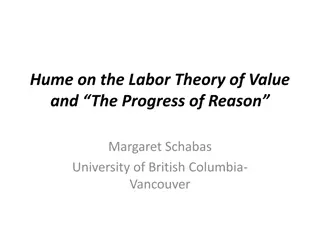OT Critics Refuted
In these excerpts, various scholars challenge traditional interpretations of ancient texts, questioning the authenticity of first-person accounts by kings and shedding light on the brutal practices of Assyrian rulers. Critics argue against long-held beliefs in historical-critical scholarship, igniting debates on the validity of biblical narratives.
Download Presentation

Please find below an Image/Link to download the presentation.
The content on the website is provided AS IS for your information and personal use only. It may not be sold, licensed, or shared on other websites without obtaining consent from the author.If you encounter any issues during the download, it is possible that the publisher has removed the file from their server.
You are allowed to download the files provided on this website for personal or commercial use, subject to the condition that they are used lawfully. All files are the property of their respective owners.
The content on the website is provided AS IS for your information and personal use only. It may not be sold, licensed, or shared on other websites without obtaining consent from the author.
E N D
Presentation Transcript
OT Critics Refuted Please do your homework! Dr. Rick Griffith Jordan Evangelical Theological Seminary BibleStudyDownloads.org
Thomas L. Thompson
"Rather than a historical text, the [Omri king of Israel as oppressor of Moab (ca. 830)] inscription, in fact[,] belongs to a substantial literary tradition of stories of kings of the past. We find a similar story (told autobiographically, in the first person), which dates back at least to the thirteenth century BCE. It is about the king of Alalakh, Idrimi, who in fact had reigned over this city [Alalakh] some two centuries earlier. Like Idrimi s tale, the Mesha story is written in the first person and presented in the voice of the king himself. (It) presents us with an epitome of the king s reign. His work is done. Both inscriptions are tributes to a great king of the past, epitomizing his reign. Thomas L. Thompson, The Mythic Past/The Bible in History (Leiden, 1993), 11-13 Response? Did any ancient kings write in the 1st person?
614 Assyrian Assyrian Brutality Brutality "A pyramid of heads I reared in front of his city. Their youths and their maidens I burnt up in the flames." Assyrian Brutality Shalmaneser, 859-824 BC = 80 years before Jonah, in Luckenbill, Ancient Records of Assyria and Babylonia, 1:213
614 Esarhaddon's Ego (660 BC) "I am powerful, I am all powerful, I am a hero, I am gigantic, I am colossal, I am honored, I am magnified, I am without equal among all kings, the chosen one of Asshur, Nabu, and Marduk!" Luckenbill, Ancient Records of Assyria and Babylonia, 2:226
Response by Kitchen TLT s knowledge of the range of use of first person in texts is clearly minimal and hopelessly misleading. Use of the first person by a monarch does not belong exclusively to either postmortem memorial texts or to later legends about such kings. A huge army of texts shows up the falsity of his presumption (Location 9825 of 14432).
Attacks by N. P. Lemche 1. Historical-critical scholarship (on the Hebrew Bible) is based on a false methodology and leads to false conclusions. 2. [Which] simply means that we can disregard 200 years of biblical scholarship and commit it to the dustbin. It is hardly worth the paper on which it is printed.
Attacks by N. P. Lemche 3. The biblical picture of ancient Israel does not fit in but is contrary to any image of ancient Palestinian society that can be established on the basis of ancient sources from Palestine or referring to Palestine. 4. There is no way this image in the Bible can be reconciled with the historical past of the region. 5. And if this is the case, we should give up the hope that we can reconstruct pre-Hellenistic history on the basis of the Old Testament. 6. [This latter] hardly predates the Greco-Roman period (i.e., not before the third century B.C. to first century A.D.).
7. [The Old Testament] is simply an invented history with only a few referents [sic = references] to things that really happened or existed. Attacks by N. P. Lemche 8. From a historian s point of view, ancient Israel is a monstrous creature. It is sprung out of the fantasy of biblical historiographers and their modern paraphrasers, i.e., the historical-critical scholars of the last two hundred years. Cited by K. A. Kitchen, On the Reliability of the Old Testament (Grand Rapids: Eerdmans, 2003), Kindle Edition. Loc 9866 of 14432.
Get this presentation and script for free! Critical Studies of the OT link at BibleStudyDownloads.org


